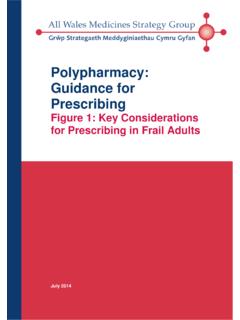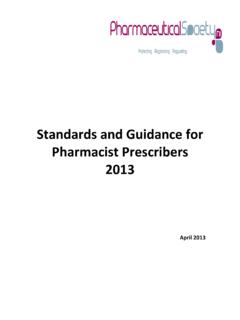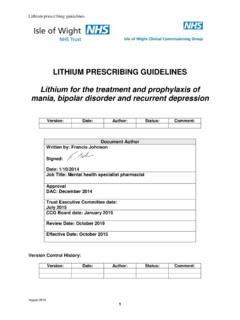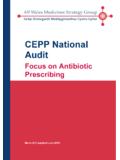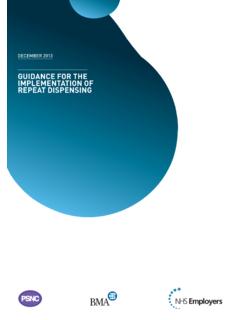Transcription of Specialised Services Circular - shsc.nhs.uk
1 Specialised Services Circular Issue date: 22 April 2016 ID SSC 1620 Category: Commissioning Status: For information and action Public & Press: Not applicable Title: Primary Care Responsibilities in prescribing and Monitoring Hormone Therapy for Transgender and Non-Binary Adults (updated) Circulation For action Local Team Assistant Directors of Specialised Commissioning Local Team Pharmacists Local Teams to circulate to: Local Medical Committees Gender Identity Clinics CCG Heads of Primary Care, and Medical Directors For information Head of Primary Care Commissioning Regional Directors of Specialised Commissioning Regional Medical Directors Background NHS England is the responsible commissioner for the Specialised element of the gender dysphoria pathway, which in England is delivered through seven specialist Gender Identity Clinics. In March 2014 NHS England issued SSC 1417. This Circular provided clarity to General Practitioners on their role and responsibilities in prescribing hormone therapy for transgender and non-binary adults.
2 In March 2016 the General Medical Council (GMC) published guidance for Doctors Treating Transgender Patients. This guidance reiterates the advice previously set out by NHS England in SSC 1417; and also explains the legal protection against discrimination and harassment given to trans people by The Equality Act 2010 and Gender Recognition Act 2004. General Practitioners should co-operate with the specialist Gender Identity Clinics and prescribe hormone therapy (feminising or virilising endocrine therapy) recommended for their patients by the Gender Identity Clinic. The specialists at the Gender Identity Clinic make recommendations for the prescription and monitoring of these therapies but they do not directly prescribe them, or provide physical and laboratory monitoring procedures for patients. The decision on whether or not to provide long-term feminising or virilising endocrine therapy requires the skills of a gender specialist physician, usually working within a Gender Identity Clinic.
3 Typical drugs recommended by Gender Identity Clinics include oestradiol preparations ( transdermal oestradiol gels and patches, and oral oestradiol preparations), testosterone preparations ( gels, and Sustanon and Nebido injection), gonadotropin releasing hormone analogues and depilatory agents ( Vaniqa ); this list is not exhaustive. Apart from Sustanon , there are no licensed products with an approved indication for the treatment of gender dysphoria. There is, however, extensive clinical experience of the use of these products in the treatment of gender dysphoria over decades, which provides evidence of tolerability and safety comparable with their use for approved indications. The prescription of licensed products outside their approved indications, often but not always at the recommendation of a specialist provider, is not uncommon in general practice. General Practitioners should collaborate with Gender Identity Clinics in the initiation and on-going prescribing of hormone therapy, and for organising blood and other diagnostic tests as recommended by the Gender Identity Clinics.
4 General Practitioners are also expected to co-operate with Gender Identity Clinics in patient safety monitoring, by providing basic physical examinations (within the competence of General Practitioners) and blood tests and diagnostic tests recommended by the Gender Identity Clinic. Hormone therapy should be monitored at least 6 monthly in the first 3 years and yearly thereafter, dependent on clinical need. The Gender Identity Clinic is expected to assist General Practitioners by providing relevant information and support, including the provision of guidance regarding the interpretation of blood test results. In recent cases some General Practitioners have declined to accept the advice of the specialist Gender Identity Clinic and have refused to prescribe and monitor drug treatments for the treatment of gender dysphoria in people with gender incongruence and trans and non-binary identity. The Royal College of Psychiatrists Good Practice Guidelines for the Assessment and Treatment of Adults with Gender Dysphoria describes how an increasing number of trans people are self-medicating using hormones and hormone-blockers available via the internet, as a consequence of the difficulties they experience in accessing appropriate primary care Services .
5 guidance published by the General Medical Council in March 2016 advises General Practitioners that they may prescribe unlicensed medicines where this is necessary to meet the specific needs of the patient and where there is no suitably licensed medicine that will meet the patient s need. This advice reiterates existing General Medical Council guidance Good Practice in prescribing and Managing Medicines and Devices (2013) which says: 69. prescribing unlicensed medicines may be necessary where there is no suitably licensed medicine that will meet the patient s need, for example, where: There is no licensed medicine applicable to the particular patient. For example, if the patient is a child and a medicine licensed only for adult patients would meet the needs of the child; or A medicine licensed to treat a condition or symptom in children would nonetheless not meet the specific assessed needs of the particular child patient, but a medicine licensed for the same condition or symptom in adults would do so; or The dosage specified for a licensed medicine would not meet the patient s need; or The patient needs a medicine in a formulation that is not specified in an applicable license.
6 The GMC s guidance for Doctors Treating Transgender Patients (March 2016) adds: You must co-operate with Gender Identity Clinics and gender specialists in the same way that you would co-operate with other specialists, collaborating with them to provide effective and timely treatment for trans and non-binary people. This includes: prescribing medicines recommended by a gender specialist for the treatment of gender dysphoria; following recommendations for safety and treatment monitoring; making referrals to NHS Services that have been recommended by a specialist. Once the patient has been discharged by a Gender Identity Clinic or gender specialist, the prescribing and monitoring of hormone therapy can be carried out successfully in primary care without further specialist input. From the patient s perspective, management in primary care is far easier, and there is no specific expertise necessary to prescribe for and monitor patients on hormone therapy.
7 It is not necessary to refer trans people back to their gender specialist before referring them to other secondary or tertiary providers, for matters unrelated to their gender history. If you feel you lack knowledge about the healthcare needs of trans people, you should, in the short term, ask for advice from a gender specialist. In the longer term, you should address your learning need as a part of your continuing professional development .. which will enable you to provide treatment to meet your patients needs. E-learning is freely available on the Royal College of General Practitioners website and carries CPD points . With regard to prescribing drugs for the treatment of gender dysphoria, as described above: The gender specialist physician takes responsibility to assess the capacity of the patient to give meaningful informed consent to use such treatment, to explain its potential risks, benefits and limitations, to explain that the treatment is not approved for this indication and the implications thereof, and to obtain and document consent before making a recommendation to a General Practitioner to prescribe treatment for their patient; The gender specialist physician takes responsibility for overseeing the patient s care in collaboration with the patient s General Practitioner, and for their recommendation that the General Practitioners prescribe and monitor treatment.
8 The gender specialist physician will provide the patient s General Practitioner with the clear written guidance on prescribing and monitoring, be available to provide additional information on request, and answer questions regarding treatment and monitoring at reasonable notice. Summary Transgender and non-binary people will spend a relatively short time under the care of a specialist Gender Identity Clinic. General Practitioners therefore have an important role in the ongoing care of patients when they no longer have a need for Specialised gender identity Services . The prescribing and monitoring of hormone therapy can be carried out safely in primary care without specialist input, though Gender Identity Clinics are encouraged to provide support to individual General Practitioners when this is requested. Action Local teams should refer to this Circular to resolve local issues should they arise. Local teams should also proactively share this Circular with colleagues responsible for commissioning primary care Services , and with Clinical Commissioning Groups and Local Medical Committees.
9 Further Information Please contact: Steve Hamer, Accountable Commissioner for Gender Identity Services , NHS England Further reading: Good Practice Guidelines for the Assessment and Treatment of Adults with Gender Dysphoria (Royal College of Psychiatrists, 2013) This Circular does not address arrangements for prescribing cross sex hormones to young trans-people, which under current protocols is permitted from a person s 16th birthday. NHS England plans to publish a clinical commissioning policy on prescribing cross sex hormones to young people who have gender incongruence by July 2016 following public consultation and a recommendation by the Clinical Priorities Advisory Group. For further information on commissioning arrangements for prescribing for young trans-people please contact James D Palmer National Clinical Director Specialised Services Cathy Edwards Operational Delivery Director Specialised Commissioning
